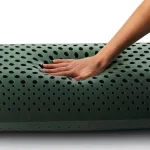The Perfect Pillow: Your Key to a Restful Night’s Sleep
A restful night’s sleep goes beyond just having the right mattress—it also depends on finding the perfect pillow. The right pillow offers crucial neck support and helps maintain proper spinal alignment, both of which are essential for preventing discomfort and improving your overall sleep quality. Here’s how to choose the ideal pillow that balances comfort and support, ensuring you wake up refreshed and pain-free.
1. Why Neck Support Matters
Your pillow plays a vital role in keeping your neck aligned with your spine. Poor neck support can result in restless nights, morning stiffness, and chronic neck pain. On the other hand, a well-chosen pillow not only helps prevent these issues but can also significantly enhance your sleep quality, leading to better overall health and well-being.
2. Choosing Based on Sleep Position
- Side Sleepers: A thick, firm pillow is essential to fill the gap between your neck and the mattress, ensuring your head stays level with your spine. This helps prevent neck strain and discomfort.
- Back Sleepers: A thinner pillow is best to maintain the natural curve of your spine. A memory foam pillow with a built-in neck contour offers great support while keeping your head aligned.
- Stomach Sleepers: For stomach sleepers, a thin pillow—or even no pillow—is ideal to avoid forcing your neck into an unnatural bend. A thick pillow could lead to neck pain and stiffness in the morning.
3. Consider the Materials
Each pillow material offers unique benefits, and your choice should depend on your personal needs and preferences:
- Memory Foam: Molds to your head and neck for customized support throughout the night. It’s great for those who need extra neck care.
- Feather: Luxuriously soft, but be cautious—feathers can shift and leave your neck unsupported during the night.
- Latex: Firm and durable, latex pillows provide excellent support and retain their shape. They’re also hypoallergenic and resistant to dust mites, making them a great choice for allergy sufferers.
- Polyester: A budget-friendly option that is soft, but tends to flatten quickly, requiring more frequent replacement.
4. Pillow Firmness
Pillow firmness can greatly affect your comfort and spinal alignment. For side sleepers, a firmer pillow is usually best, while back and stomach sleepers may prefer something softer that better accommodates their natural sleeping posture.
5. Pillow Height: Get the Right Loft
Pillow height—or loft—should be carefully considered to ensure proper neck alignment. Look for adjustable pillows that allow you to customize the height to match your body size and sleeping position for a truly personalized sleep experience.
6. Hypoallergenic Pillows for Allergy Sufferers
If allergies are a concern, opt for hypoallergenic pillows designed to resist dust mites, mold, and pet dander. Latex, memory foam, and certain synthetic fibers are excellent choices for keeping allergens at bay while providing excellent support.
7. Durability and Easy Maintenance
When investing in a pillow, you’ll want it to last. Look for durable materials and check if the pillow has a removable, machine-washable cover. Easy maintenance ensures better hygiene and extends the life of your pillow, keeping it fresh for longer.
8. Testing Pillows Before You Buy
Whenever possible, try pillows in-store to get a feel for the firmness and support they offer. Many retailers also offer return policies, allowing you to test the pillow at home for a few nights to see if it suits your needs.
Conclusion: Invest in Your Sleep
The right pillow can make all the difference in your sleep quality. By selecting one that suits your sleeping position, offers adequate neck support, and is made from materials that match your preferences, you’ll be on your way to better, more comfortable rest. Don’t underestimate the power of the perfect pillow—it’s just as essential as finding the right mattress. Sleep well, and wake up feeling your best!
Explore our wide selection of pillows to find your perfect match here.


 Blankets
Blankets Mattress Protectors
Mattress Protectors Sheets
Sheets












